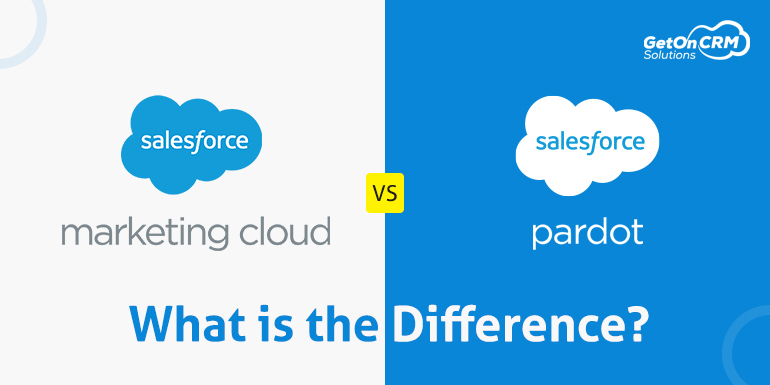In the bustling digital era, the concept of B2B marketing automation has taken centre stage. Tools like Salesforce Marketing Cloud and Salesforce Pardot have emerged as critical elements in this new marketing paradigm, offering companies a chance to streamline their marketing efforts and improve lead generation and management. This blog post aims to unravel the differences between these two platforms, offering insights into their functions, key features, and use cases, with the ultimate goal of helping you choose the one that suits your business needs the best.
Understanding Salesforce Marketing Cloud
Overview of Salesforce Marketing Cloud
Salesforce Marketing Cloud is a comprehensive digital marketing platform that facilitates customer journey mapping, email marketing, social media marketing, mobile marketing, advertising automation, and data analytics. It offers an integrated approach to customer relationship management (CRM), enabling businesses to harness the power of data to deliver personalized and engaging customer experiences.
Key Features of Salesforce Marketing Cloud
- Email Marketing Automation
Salesforce Marketing Cloud’s email marketing automation allows marketers to create personalized email campaigns, which can be scheduled and targeted based on customer behaviour and preferences.
- Social Media Marketing Automation
With social media automation, marketers can manage their channels, schedule posts, and monitor customer interactions to boost engagement.
- Mobile Marketing Automation
The mobile marketing automation feature enables businesses to connect with customers through SMS, push notifications, and in-app messages.
- Advertising Automation
The advertising automation feature assists in creating and managing advertising campaigns across various channels, optimizing advertising budgets and performance.
- Journey Builder
One of the most powerful tools within Salesforce Marketing Cloud, the Journey Builder, allows businesses to design and automate customer journeys across multiple touchpoints, offering personalized experiences based on individual behaviours and preferences.
- Data and Analytics
Salesforce Marketing Cloud provides extensive data and analytics tools that help businesses gather and analyze data from various sources, facilitating informed decision-making.
- Personalization and Customer Experience Enhancement
The platform enables businesses to create tailored customer experiences through AI-powered recommendations and predictive analytics.
Exploring Salesforce Pardot
Salesforce Pardot is a B2B marketing automation platform focusing on lead generation and management. It enables businesses to create personalized email marketing campaigns, landing pages, and forms while offering marketing analytics and ROI reporting.
Key Features of Salesforce Pardot
- Lead Generation and Management
Pardot excels at generating high-quality leads and managing them effectively through scoring and grading, ensuring sales teams focus on the most promising prospects.
- Email Marketing and Nurturing
Pardot’s email marketing and nurturing tools allow businesses to create, automate, and measure email campaigns, driving engagement and conversion.
- Landing Pages and Forms
With Pardot, businesses can create custom landing pages and forms to capture lead information and nurture them through their buying journey.
- Marketing Analytics and ROI Reporting
Pardot provides detailed analytics and ROI reporting tools, enabling businesses to measure the effectiveness of their marketing efforts and make data-driven decisions.
- Sales Alignment and CRM Integration
Pardot’s tight integration with Salesforce CRM and its focus on sales alignment make it ideal for businesses looking to better align their sales and marketing teams.
- Engagement Studio
The Engagement Studio in Pardot is a visual tool for creating personalized customer journeys, helping businesses better understand and engage their leads and customers.
- Dynamic Content
Pardot’s dynamic content feature allows businesses to tailor their content based on the viewer’s characteristics and behaviours, enhancing personalization and relevance to drive engagement.
Also Read: 6 Ways Salesforce Pardot Will Help You To Grow More Business
Pardot vs Marketing Cloud: A Comparative Analysis
Target Market and Ideal Use Cases
Salesforce Marketing Cloud and Pardot provide B2B marketing automation capabilities, but their target markets differ. Salesforce Marketing Cloud caters to various industries and businesses looking to reach customers across multiple channels. On the other hand, Pardot’s features specifically cater to B2B companies seeking a tighter alignment between sales and marketing.
Functionality and Scalability
Salesforce Marketing Cloud offers robust functionalities with multiple integrated platforms, making it highly scalable and adaptable to large businesses with complex needs. Pardot, in contrast, focuses more on lead generation and management, making it a perfect fit for small to mid-sized companies focusing on growing their customer base.
Lead Generation and Nurturing
Pardot shines in its lead scoring and grading capabilities, enabling businesses to prioritize leads effectively. Salesforce Marketing Cloud, though, offers a more comprehensive suite of tools, including its renowned Journey Builder, perfect for companies seeking to personalize the customer journey.
Email Marketing and Campaign Management
Both platforms offer robust email marketing capabilities. Salesforce Marketing Cloud provides advanced email marketing tools like personalized email journeys and predictive intelligence. Pardot, however, offers intuitive email marketing and nurturing features coupled with easy-to-use email templates.
CRM Integration and Sales Alignment
Both platforms integrate seamlessly with Salesforce CRM. However, Pardot’s sales alignments features, such as CRM integration and lead qualification, offer an edge for businesses looking to improve their sales and marketing collaboration.
Reporting and Analytics
Salesforce Marketing Cloud provides advanced analytics with real-time tracking and detailed insights. Pardot, on the other hand, offers comprehensive marketing analytics with a focus on ROI reporting, making it easy to measure and justify marketing spend.
Also Read: EV Company See Nearly 50% Return On Investment With Salesforce Marketing Cloud
Which One is Right for You?
Evaluating Business Needs and Goals
The decision between Salesforce Marketing Cloud and Pardot should be based on your business needs and goals. If you focus on lead generation and sales alignment, Pardot might be a better fit. However, if you’re looking for a comprehensive marketing solution with a multi-channel approach, Salesforce Marketing Cloud might be the right choice.
Budget Considerations and Cost Analysis
Both platforms come with different pricing structures. While evaluating, consider your marketing budget and compare both venues’ costs and features.
Technical Expertise and Implementation Effort
Salesforce Marketing Cloud might require more technical expertise to utilize its full potential. In contrast, Pardot is known for its user-friendly interface, making it easier to adopt, especially for smaller teams.
Scalability and Growth Potential
Your choice also depends on your business’s growth potential. Salesforce Marketing Cloud can support large-scale, complex marketing operations, while Pardot is ideal for companies focusing on steady growth and lead nurturing.
Real-Life Use Cases and Success Stories
Research case studies and success stories of businesses similar to yours that have used either platform. These real-life examples can give you insights into how these platforms might work for your business.
B2B Marketing Strategies and Lead Generation Tips
Crafting Effective B2B Marketing Strategies
Effective B2B marketing strategies should focus on defining your target audience and personas, developing thought leadership through content marketing, implementing account-based marketing (ABM), and providing a multi-channel and omnichannel experience.
Leveraging Salesforce Marketing Cloud or Salesforce Pardot for Lead Generation
Depending on your chosen platform, you can optimize your lead generation efforts in several ways. Landing pages and forms can be tweaked to capture lead information effectively. Both platforms offer lead scoring and nurturing programs to prioritize and engage leads. Dynamic content and personalization, a standout feature on both platforms, can boost lead engagement and conversion.
Salesforce CRM Integration with Marketing Automation
Benefits of Integrating Salesforce CRM with Marketing Automation
Integrating Salesforce CRM with either Pardot or Marketing Cloud brings several benefits. It provides a unified view of each customer, helping you better understand their needs and preferences. It also streamlines the sales and marketing process by ensuring both teams can access the same information and work together efficiently.
Seamless Data Sync and Single Customer View
The integration allows seamless data sync between your marketing automation platform and CRM, ensuring data consistency. A single customer view can enrich customer insights, enhancing personalization and engagement.
Streamlining Sales and Marketing Collaboration
By integrating Salesforce CRM with your chosen marketing automation platform, sales and marketing teams can work together more effectively. It can foster better alignment, reduce silos, and promote more coordinated and effective customer engagement.
Leveraging CRM Data for Personalization and Segmentation
CRM data can be leveraged for personalization and segmentation in your marketing efforts. Customer behaviours, preferences, and interaction data can be used to create highly targeted campaigns that resonate with your audience.
Conclusion
Salesforce Marketing Cloud and Pardot are powerful marketing automation platforms that can help businesses enhance their B2B marketing efforts. While they share many features, their differences lie in their core capabilities and focus areas. Salesforce Marketing Cloud offers a comprehensive, multi-channel marketing approach, making it suitable for businesses seeking advanced marketing capabilities. Pardot, on the other hand, specializes in lead generation and nurturing, focusing on aligning sales and marketing efforts.
GetOnCRM has some of the finest Salesforce Pardot consultants to lend you a hand in boosting sales with Pardot at every step in your sales implementation process. We aim to assist clients with Pardot services to deliver lightning-fast solutions. Our consultants can also provide counsel to ensure maximum profitability and ROI.

















